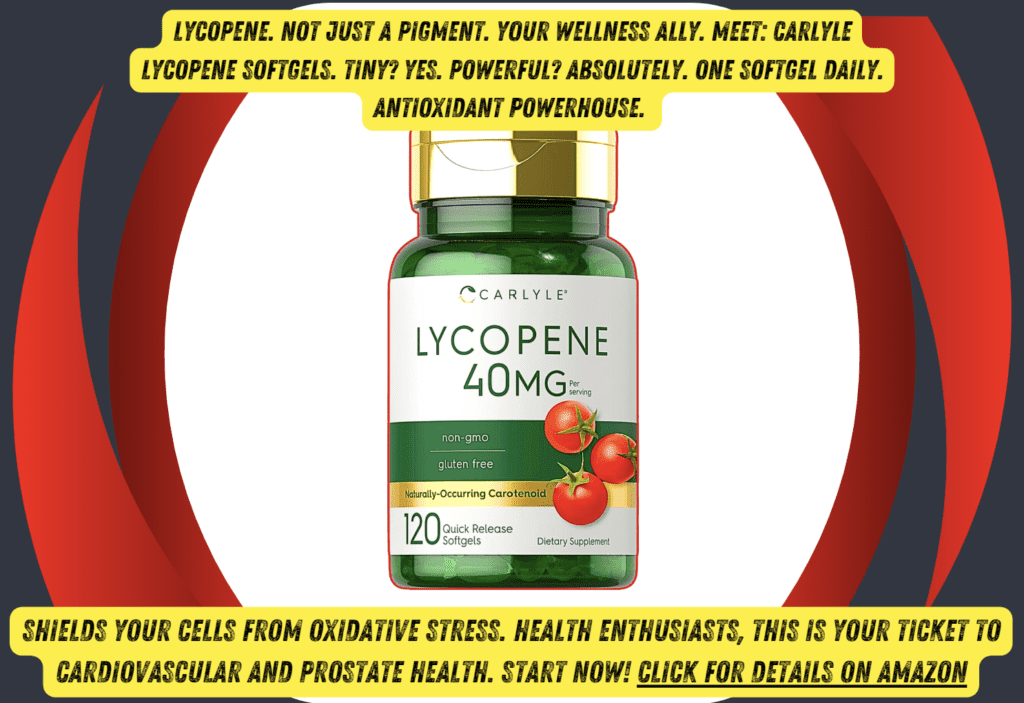What is Lycopene? Benefits + Usage
Do you ever feel like you’re constantly bombarded with the latest and greatest superfoods? Coconut oil, matcha, acai berries—you name it. Well, move over kale, ’cause there’s a new nutrient in town: Lycopene. But what is this magical compound, and why should you care? Buckle up, because we’re diving into the juicy details. 😎
Lycopene is a powerful antioxidant—a fancy term for a substance that helps your body combat free radicals. Free radicals sounds like a group of rebellious teenagers, but they’re actually unstable molecules that can damage your cells. Yikes! Enter lycopene, our free radical-fighting hero. 💪
Found in tomatoes, watermelon, pink grapefruit, and other red fruits, lycopene gives these foods their vibrant hue. Yes, it literally paints them red. 🍅🍉 And the benefits? Oh, honey, they’re worth every tomato slice you add to your salad.
First off, let’s talk heart health. Lycopene has been shown to reduce the risk of heart disease. Who needs a cardio class when you have lycopene? JK, still do your cardio—but lycopene helps too. Studies indicate that it lowers LDL cholesterol levels (that’s the bad kind) and reduces blood pressure. So, sprinkle some extra tomatoes on that pizza. Doctor’s orders. 🍕
Lycopene is your bestie when it comes to maintaining that glow. Its antioxidant properties protect your skin from harmful UV rays. Yes, please! Move over, SPF—there’s a new sheriff in town. While you still need your sunscreen (be smart, folks), lycopene adds an extra layer of protection. 🧴
Let’s not forget about cancer prevention. Some studies suggest that lycopene may lower the risk of certain types of cancer, including prostate cancer. Imagine saving lives just by eating more salsa. I can live with that. 🌮
Now for the practical stuff—how do you up your lycopene game? Tomatoes are the poster child, but cooking them actually increases their lycopene content. That’s right. Sauce it up! 🍝 Ketchup, tomato soup, even pizza sauce—all fair game. Watermelon and pink grapefruit are fab, too. Juicy and delicious, it’s a win-win.
What’s the catch? Ah, yes—the fine print. Lycopene supplements are available, but it’s always better to get your nutrients from whole foods. I’m looking at you, supplement hoarders. 🚫 Natural sources provide additional nutritional benefits that pills just can’t mimic.
In summary: Lycopene is like the dazzling red cape in your superhero wardrobe. It fights free radicals, promotes heart health, and gives you that natural glow—no Instagram filter needed. So next time you’re grocery shopping, remember to paint your plate red. Your body (and your skin) will thank you. 🌟
Q&A Time: Lycopene Edition
Q: Can lycopene really help with sun protection?
A: Absolutely! Lycopene’s antioxidant properties give your skin a surprising edge against UV rays. 🍓 But don’t toss out your sunscreen just yet! Continue to slather on your SPF while lycopene works its magic behind the scenes. Think of it as your dynamic duo for skin protection. 🛡️
Q: How much lycopene should I be consuming?
A: Great question! There’s no official daily recommendation, but studies suggest aiming for at least 6-15 mg per day. 🍅 To put that in perspective, half a cup of tomato sauce has about 20 mg of lycopene. So, yes, a hearty pasta night could be your ticket to lycopene greatness.
Q: Are there any side effects to consuming too much lycopene?
A: Remember, too much of a good thing can backfire. Overconsumption of lycopene may lead to a condition called lycopenodermia, where your skin takes on an orangey tint. 🟧 Not exactly the glow-up you were envisioning, right? Moderation is key, folks.
Q: Can lycopene help with heart health?
A: You bet! Lycopene’s antioxidant abilities extend to your cardiovascular system, reducing the risk of heart disease by lowering “bad” LDL cholesterol levels. 🫀 So, when you’re piling on those tomatoes, know your heart is leaping with joy.
Q: What’s the best way to incorporate more lycopene into my diet?
A: Look no further than your pantry staples—tomato paste, ketchup, and even good old salsa are your allies. 🍅 Cooked tomatoes, in particular, have an even higher lycopene content. But let’s not ignore watermelon and pink grapefruit for a sweet twist. And remember, whole foods are your best bet over supplements. Eat smart and eat natural! 🌿
Feeling like a lycopene expert yet? Time to strut into that grocery store and paint your cart red! 🎨

